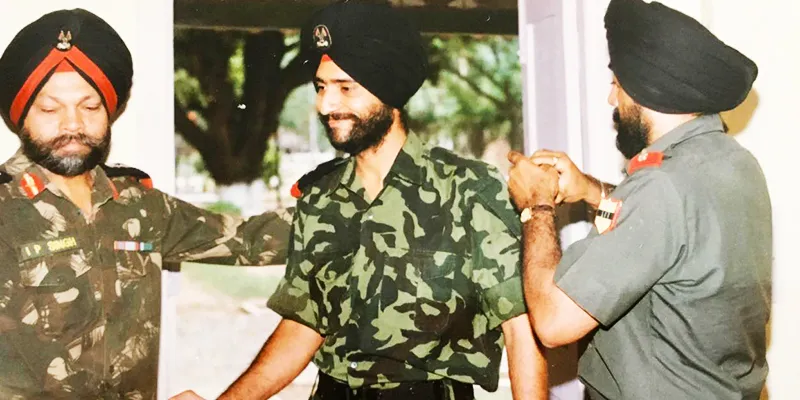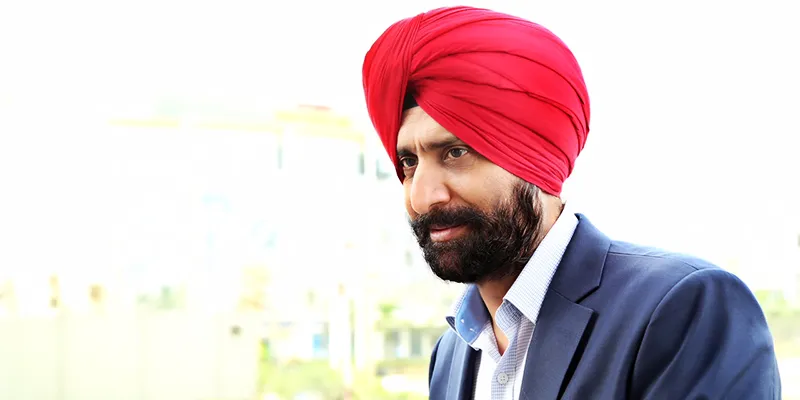From Indian Army trenches to the corner office, Kulmeet Bawa shoots from the heart
In an interview with YourStory, Kulmeet Bawa shares the story on his move from the Army to the corporate world.
As he walks into the business center of the Oberoi in Gurgaon, Kulmeet Bawa’s persona is impossible to ignore. Fit and brimming with positive energy, Kulmeet is every bit a man of action. Transitioning from dusty terrains and tanks to the boardroom, Kulmeet now leads Adobe India's growth as its Managing Director.
In a tete-a-tete, Kulmeet shares his story from the frontline to the corner office! Excerpts from an interview.

The starting gunshot
Hailing from Punjab, and schooled in Delhi, Kulmeet left home at 16. He later joined the National Defence Academy (NDA) in Pune.

“I always wanted to join the Army as my father was in the Forces himself. After spending three years at the NDA, I put in another year at the Indian Military Academy in Dehradun and was commissioned as a second lieutenant by the time I was 20.”
The NDA taught him to lead from the front, and to face challenges head-on. “It was a brand-new world, which I initially disliked, but in retrospect, was the best thing to happen to me. Undoubtedly, the academy brings you down to Mother Earth and helps imbibe the qualities of leadership, ground up.”
Commissioned into the Armoured Corps, an elite arm of the Indian Army, Kulmeet served for about 12 years in various capacities – as Aide de Camp (ADC) to the Governor of a state, taught strategy at the Armoured Corps Centre, and was in Jammu & Kashmir for several years. “Nobody taught us leadership in the real world - I learned on the job.”
Battling the tough life
Life in the Army taught the value of strong bonds, the fatality of mistakes, and the importance of teamwork, say Kulmeet. “I have to admit that life in NDA was tough. There is ragging, but also a lot of discipline. My biggest learning, of course, revolved around the importance of teamwork.

“There are no brownie points for individuals. You don’t win battles unless you are in a team. If you make a mistake, the whole team is punished. You build strong bonds and learn what it is to sacrifice your life for someone else. This learning never goes away. And that’s why I say it’s one of the best things that happened to me.”
From border to boardroom
While in the army, Kulmeet also honed his technical skills in his free time, taking up certificate courses like MCSE, CCNA, CCNP, and CISSP. Twelve years after donning the uniform, the ‘what next’ bug bit him, and with premature retirement from the Army, he went back to school, albeit, this time a business school.

“I wanted to go to a B-School and was looking at Stanford or Wharton. I visited a couple of these colleges and when I returned, I heard of the Indian School of Business, which I later joined and got myself a Wharton degree. I was fortunate enough to have got offers from Unilever and a few other companies, but eventually decided to join Sun Microsystems, perhaps being enamored by Bhaskar Pramanik (President, Sun Microsystems) who became a mentor for my transition into the corporate world.”
I spent more than six years at Sun, followed by a couple of years at Microsoft before finally joining Adobe, where I have been for almost six years now.

Leadership tenets
Kulmeet seeks to seamlessly combine the discipline and principles of teamwork, learnt and honed in the Army, into his corporate roles.
“I don’t micro-manage or get into someone else’s job. Yet you need to constantly raise the bar for your team, expanding them to think big, and foster a vision that means something to them personally. The other critical aspect is what you measure yourselves against – what is your consideration set or playing field. Typically, I have found, over the years, that the crazier the goals you set for yourself, however absurd they seem – they often tend to fructify. Which is the only way you manage to leapfrog.”
For Kulmeet, discipline is critical, especially when one is responsible for people, more so when one reports in numbers. It is akin to training the team in times of peace so they don’t bleed in war. As a leader, one needs to ensure they don’t bring back people in body-bags at the end of the year. This, in short, needs the application of Sun Tzu’s Art of War in the boardroom.

High performance starts with a strong team, which, in turn, depends on the ability to hire and train well, says Kulmeet.“When someone comes to me for an interview, I never keep a copy of the person’s profile in front of me. I am not interested in what you want to showcase, I am more interested in finding out what lies beneath your personality. When you hire, you are doing it for attitude and for how the person has reached where he or she has, the intensity of the struggle and the resilience.”
“What are you gauging when you are hiring? You are looking at the future, and what the person can do in the next three to five years. You are hiring for that streak of hunger and passion. And of course, the vision.”
According to Kulmeet, growing or turning around a business is fun because of the challenge. One is only as good as the outcome. There is no place to hide here, as numbers don’t have greys and they don’t lie!







